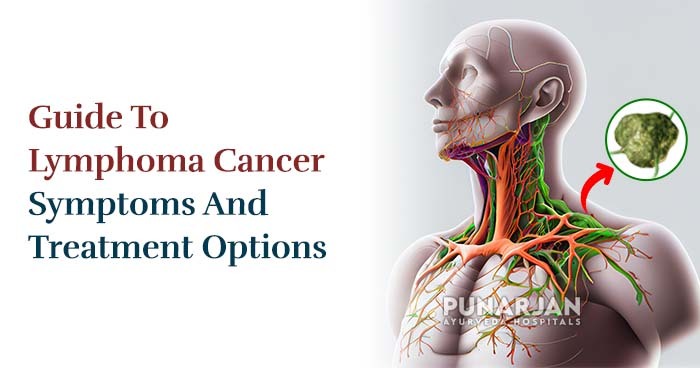
The lymphatic system (part of the immune system) is the germ-fighting network of the human body. It includes lymph glands or nodes, thymus gland, spleen, and bone marrow. Lymphoma cancer impacts these organs as well as others throughout the body.
There are two sub-types of lymphoma – Hodgkin’s and Non-Hodgkin’s. The treatment methods depend on the type and severity of the disease. Let’s learn in-depth about lymphoma cancer symptoms, stages, diagnosis, and treatment for a clear understanding.
What Is Lymphoma?
Lymphoma is a general term used to describe the cancer of the lymphatic system. It consists of tissues, vessels, and organs that fight against infections in our bodies. The condition begins in the white blood cells and is considered a type of blood cancer.
Lymphoma cancer symptoms vary depending on the type and stage of the disease. Treatment usually involves chemotherapy, radiation, and stem cell transplants. Early diagnosis and proper treatment are essential for achieving a successful outcome.
Lymphoma cancer cells can grow slowly or quickly, depending on their type. A child, teenager, or even an adult can develop the disease. However, treatment can remit or cure it.
Types Of Lymphoma
There are two main lymphoma types besides the various sub-categories.
Non-Hodgkin
It is the most common lymphoma type. B and T lymphocytes are responsible for its development. Each lymph node in the body may or may not be affected by tumour growth.
Hodgkin
The presence of Reed-Sternberg cells helps doctors identify Hodgkin’s cancer, which are abnormally large B lymphocytes, helps doctors identify Hodgkin’s cancer. This cancer develops from a lymph node to the adjacent one.
Risk Factors Associated With Lymphoma
Different risk factors are associated with different lymphoma cancer types. Here are a few –
- Age – Most lymphoma cancer symptoms are found in people around 60 years or older.
- Sex – The non-Hodgkin cancer is more common in women, while the Hodgkin type is common in men.
- Infection – Bacterial and viral infections like EBV (Epstein-Barr virus) increase the risk of non-Hodgkin cancer. Besides, HIV infection weakens the immune system and may cause Hodgkin lymphoma.
- Ethnicity – Non-Hodgkin cancer type is more common in developed nations. Americans have a higher risk than Asians or Africans.
- Family History – Having a sibling who has had lymphoma increases its risk. If the sibling is an identical twin, the risk is even higher.
- Immunodeficiency – People with a weaker immune system are at a higher risk of the disease.
- Diet & Weight – Being overweight or obese may speed up the growth of lymphoma cancer.
Lymphoma Cancer Symptoms
Lymphoma cancer symptoms are sometimes similar to less severe diseases like the common cold. The difference is they continue to exist for an extended period.
Painless swelling in the lymph nodes is a common sign. It can be at the groin, neck, armpits, or abdomen. Lymphoma is often confused with back pain. The overlapping of lymphoma cancer symptoms with other viral infections often results in misdiagnosis.
Here are a few lymphoma cancer symptoms to observe and monitor.
Common Early Symptoms
Some common symptoms of both types of lymphoma may include:
- Continuous fever without infection
- Swollen glands
- Chills and night sweats
- Breath shortness
- Reduced appetite and weight loss
- Fatigue
- Unusual itching
- Pain after alcohol consumption
Other Symptoms Based On Lymphoma Type
Some additional symptoms of non-Hodgkin cancer type may include:
- Chest pain
- Continuous coughing
- Bloating
- Abdominal pain
Lymphoma cancer may rapidly spread from one lymph node to another. The immune system may not defend it when it spreads into the other tissues.
Staging of Lymphoma
There are four main stages of lymphoma, numbered from 1 to 4. The staging of lymphoma is determined by the location of the lymphoma in relation to the diaphragm, which is the muscle separating the chest from the abdomen.
Stage 1
Lymphoma exists only in a single group of lymph nodes in the first stage. It can be in the neck or any other lymph node.
Stage 2
Lymphoma occurs in two or more lymph nodes in the second stage. However, they are on the same side of the diaphragm.
Stage 3
In the third stage, lymphoma exists on both sides of the diaphragm.
Stage 4
This is the most advanced lymphoma stage. Cancer has spread to at least one body organ besides the lymphatic system. It could be the lungs, liver, bone marrow, etc.
Diagnosis And Treatment Options
Currently, no routine screenings or tests exist for lymphoma. However, recognising lymphoma cancer symptoms early is crucial for timely treatment. Here are some tests commonly used to confirm lymphoma cancer symptoms:
- To diagnose a disease, a surgeon may perform a biopsy or blood test, in which the lymph tissue samples are taken. In some circumstances, a bone marrow biopsy may also be considered.
- Imaging tests such as CT scan, MRI, PET scan, X-ray, and ultrasound play a crucial role in diagnosis.
- Another diagnostic approach is a spinal tap that uses local anaesthesia to collect spinal fluid in order to identify lymphomas.
Hodgkin Lymphoma Treatments
Chemotherapy is the main treatment option for Hodgkin lymphoma. However, it is followed by radiotherapy for effective results. Steroid medicines are also combined for a comprehensive treatment.
Surgery is not a treatment option for Hodgkin lymphoma. However, treatment for Hodgkin lymphoma is effective, and people can be cured successfully.
Non-Hodgkin Lymphoma Treatments
Non-Hodgkin lymphoma is typically managed through chemotherapy or radiotherapy, though immediate treatment may not be necessary for some individuals. In certain cases, patients may require monoclonal antibody therapy, steroid medicine, or immunotherapy.a.
Prevention Tips for Lymphoma Cancer
The suggestions below can be considered to prevent the risk of lymphoma cancer –
- Avoid things that increase hepatitis C and HIV risk
- Maintain healthy BMR
- Get screened regularly after 50 years of age
- Avoid smoking
- Follow a healthy diet
- Stay physically active
- Avoid exposure to radiation and other harmful chemicals
How Does Punarjan Ayurveda Help Fight Lymphoma Cancer?
At Punarjan Ayurveda, we follow a holistic approach to Lymphoma disease. We go beyond regular medical care to provide personalised treatment plans for each patient. Our skilled ayurvedic practitioners use herbal medicines. They suggest lifestyle changes to heal the body and improve spiritual well-being.
We start by understanding each person’s unique body constitution. We create bhasmas using natural metals and organic botanicals. Some of our medications have immune-boosting and detoxifying effects. Punarjan Ayurveda aids in recovering from Lymphoma disease, fostering positivity, resilience, and adaptability.
We trust in Ayurvedic cancer treatment because we believe in the body’s natural ability to heal itself. We combine science with spirituality to support you in every way.
Here are a few methods to treat Lymphoma –
- Using Bhasmas: Bhasmas are special substances made from metals that undergo calcination. Examples include Swarnamakshika Bhasma and Abhraka Bhasma. These substances have a targeted effect on cancer cells. They kill toxic cells (apoptosis) while leaving normal cells unharmed.
- Removes Toxins– Detox treatments help remove toxins and excess doshas, which are the causes of disease. The removal makes your body healthy again.
- Promotes Healthy Cells – We pick special herbs full of antioxidants to feed your cells. This stops harmful free radicals and shields your cells from getting harmed.
- Body Cleansing – Ayurvedic methods are used to cleanse the body. Therapies like Vamana and Rakyamokshana get rid of harmful substances and lower mutations.
Conclusion
Understanding lymphoma cancer symptoms and treatment options is crucial for timely diagnosis and effective management. With advancements in medical science, various treatment modalities, including chemotherapy, radiotherapy, and immunotherapy, offer hope for patients with lymphoma. Additionally, holistic approaches like Ayurveda, as offered by Punarjan Ayurveda, provide personalised treatment plans that focus on restoring the body’s natural balance and promoting overall well-being. By combining traditional and modern treatment methods, individuals can enhance their chances of recovery and lead fulfilling lives post-treatment.
FAQs
What Is The Best Treatment For Lymphoma?
Chemotherapy is a widely considered treatment for lymphoma. Other methods used for treatment include radiation therapy, immunotherapy, steroid medicines, etc.
What Are The New Treatment Options For Lymphoma?
CAR-T cell therapy is an advanced treatment option for lymphoma. Certain T cells are taken from the blood and genetically modified to fight the disease. The cells are then infused into the body to fight against cancerous tumours.
Can Lymphoma Be 100% Cured?
Lymphoma can be cured in many cases with treatments like chemotherapy, radiation, and immunotherapy. It has a cure rate between 80% and 90%.
How Does Lymphoma Affect A Person’s Life?
Lymphoma attacks the bone marrow, where new cells are produced. The inability to make new blood cells results in increased infections and a shortage of white blood cells.
How Long Can A Person Live With Lymphoma?
The survival rate for lymphoma is generally 72% over a 5-year period. Early diagnosis and slow-growing lymphomas tend to have better outcomes.
What Are The Warning Signs Of Lymphoma?
Persistent fatigue, swelling in the lymph nodes, night sweats, fever, breath shortness, etc., are a few warning signs. There can also be unexplained weight loss or skin itching.


